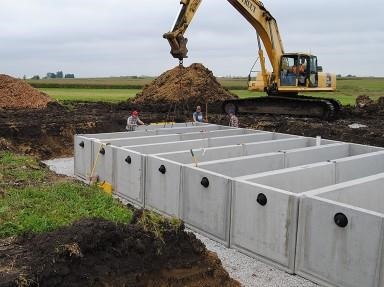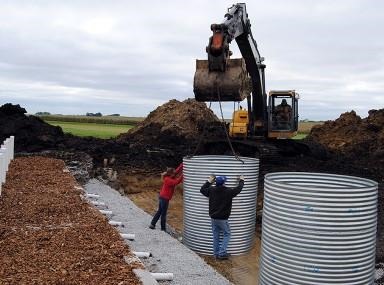By Adityarup "Rup" Chakravorty
Bioreactors are underground trenches filled with woodchips. They have been gaining traction as a tool to remove nitrogen from the water in agricultural settings.

Contractors place concrete bioreactor liners into the trench.
The water draining from fields is channeled into the bioreactors. Natural microbes living on the woodchips remove the nitrogen compounds in the water as it flows through.
Because it is the bacteria that do this water-cleaning process, it's called a biological process, hence the name bioreactor.
The water exiting the bioreactors has much less nitrogen, making it healthier for the environment.
In a new study, researchers tested parameters that could help estimate the working lifespan of these bioreactors. The research was published in Agrosystems, Geosciences & Environment, a publication of the American Society of Agronomy and Crop Science Society of America.
“Our goal is to give farmers and other stakeholders a better understanding of how long these systems will last when they are used in the field,” says Abby Schaefer, lead author of the study.
The study spanned two years. The researchers tested nine bioreactors. By the end of that time, all the bioreactors were still effectively removing nitrogen from the water.
Removing nitrogen from the drainage water in agricultural settings is crucial because nitrogen can be a double-edged sword.
Crops need nitrogen to grow and produce food. But too much nitrogen in the wrong place can cause problems.

Natasha Hoover (left) and contractors (Con-Struct Inc) install the culverts to be used as sampling wells.
Excess nitrogen can contaminate groundwater and waterways. In these aquatic environments, too much nitrogen can fuel harmful algal blooms.
The algae quickly use up all the oxygen in water bodies. This can lead to dead zones, which are areas with too little oxygen to support life.
Woodchip bioreactors are one way to reduce the amount of nitrogen entering waterways. The bioreactors have several advantages over other denitrifying techniques.
Bioreactors can consistently reduce 30-50% of nitrogen compounds from water. “Some bioreactors can achieve even higher reductions,” adds Schaefer.
“Bioreactors require very little land to be taken out of crop production,” says Schaefer. “Plus, they require very little maintenance.”
The bioreactors also do not impact the effectiveness of farm tile drainage systems. This means water in fields can still be drained to help prevent flooding.
One challenge with woodchip bioreactors is the settling and breakdown of the woodchips. This affects how efficiently the bioreactors work.
The researchers found that the woodchips closer to the entryway of the bioreactors settled and broke down faster than woodchips further inside.
Click here to see more...